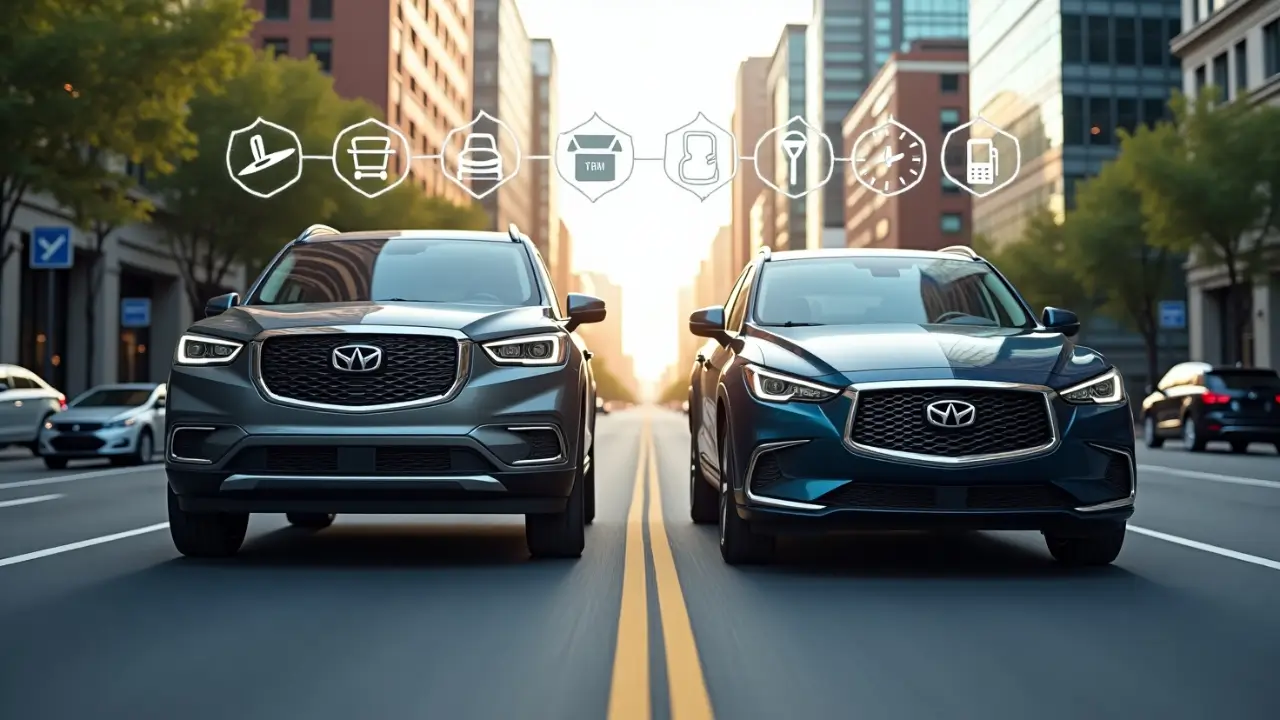SUVs vs. Sedans: Which is right for you? Compare space, comfort, mileage, and performance to choose the perfect car for your lifestyle.
Introduction
SUVs vs. Sedans, a tale as old as time (well, not quite, but close) Which is the best option when buying a new car? Both kinds of vehicles have definite pros and cons, making the choice a matter of lifestyle, budget, driving needs and personal preference. In this deep dive comparison, we’ll dissect the pivotal factors such as size, performance, fuel economy, cost and practicality to help you decide which one is right for you.
Size & Space
The first and most apparent difference between SUVs and sedans is their size.
SUVs are bigger providing more space in the cabin taller seating positions and more cargo capacity. This make them perfect for families, frequent travelers and anyone needing extra space for cargo sports equipment or outdoor activity. Many SUVs have one to two optional sets of third row seating to fit seven or eight passengers.
Sedans are also more compact in design this makes them more maneuverable in small environments such as most urban environments with tight city streets or parking garages. Although they offer decent trunk space they aren’t able to compete with the cargo hauling ability of a sport utility vehicle.
Performance & Handling
Each style be it sedans or SUVs, has advantages in the driving departments.
SUV models typically feature all-wheel drive (AWD) or four-wheel drive (4WD) making an SUV a more rugged choice for difficult road conditions, snow and off road driving. They’re also comparatively a bit higher up off the road which offers a commanding view of the road ahead but could lead to a bit less high-speed stability in highway driving due to a higher center of gravity.
Sedans are better to handle, especially on city roads and on highways. They are more stable and corner better (lower center of gravity). Lighter which means crisper steering and more agile rides.
Fuel Efficiency
When it comes to comparing SUVs and sedans one of the major considerations is fuel efficiency.
SUVs are generally less efficient, because of larger sizes heavier weights and bigger engines. But gas mileage has improved on modern SUVs and hybrid or electric SUV models provide options for those trying to save on fuel.
As a general rule cars are more fuel efficient than SUVs which makes sedans the ideal option for long commutes or busy city driving. Hybrid sedan models are even more efficient but a smaller engine is less fuel hungry regardless.
Cost of Ownership
Long-term costs become important for car ownership, beyond the sticker price.
SUVs usually cost more to buy and their larger size more complicated drive train systems and pricey components add to maintenance costs. Repair costs can also lead to higher insurance rates for SUVs than for sedans.
Sedans tend to have a lower initial purchase cost and running costs. Their parts are usually cheaper and their insurance premiums are typically lower than those of SUVs.
- Audi GT50 Concept: A Loud Reminder of Why Car Enthusiasts Fell in Love With Audi
- Nearly 30% of UK Drivers Believe Car Tax Should Be Based on Mileage — Survey
- Why Planes and Boats Escaped the Luxury Tax But Cars Didn’t
- Australia’s Headlight Confusion: Authorities Warn Drivers After Viral $250 Headlight Rule Goes Wild Online
- 2025 Hyundai Venue Facelift Launched in India – Full Details, Variants, and Price
Safety
While SUVs and sedans with modern safety features in common there are essential differences
SUVs, potentially because of their size and higher driving position create a sense of safety in crashes with smaller cars. But they are also at greater risk of rolling over because of a higher center of gravity.
Their increased stability at high speed means sedans also tend to have a lower rollover risk. Many sedans also offer cutting edge safety options like automatic braking, lane keeping assist and adaptive cruise control.
Lifestyle & Practicality
The decision to choose between an SUV and a sedan is primarily based on your way of life.
SUVs are more ideal for larger family’s outdoor re-creationists and people who regularly carry cargo or take long trips. They also do better in extreme weather conditions.
Sedans are suited for daily commuters, young professionals and those who want a smooth, economical and fuel-efficient driving experience.
Final Judgment: Which is Best for You?
- Go for an SUV if you require extra space, elevated ride heights, off-road capabilities, and more cargo space.
- Go with a sedan if you favor fuel efficiency, maneuverability, lower costs and a comfortable smooth ride.
- Ultimately, whether you choose an SUV over a sedan comes down to your personal needs and priorities. Not so if you need a practical, affordable and fuel-efficient car, which is where a sedan might just fit the bill.
